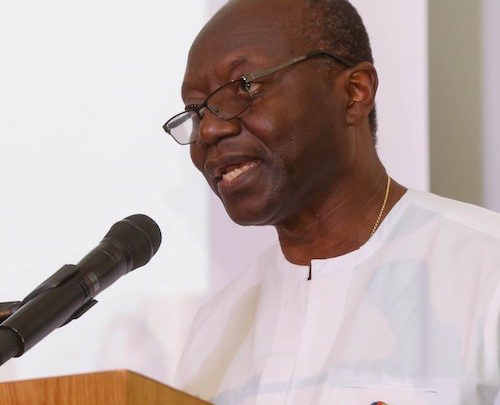
The Minister of Finance, Ken Ofori-Atta will seek to address four critical issues bordering Ghanaians, and for that matter economic analysts as he appears before Parliament today to present the 2019 mid-year budget review.
These issues include the country’s unmet revenue mobilisation targets, escalating public debt, the luxury vehicle tax and other taxes and post International Monetary Fund (IMF) matters.
According to the public, financial analysts, think tanks, labour front, whose views the Ghanaian Times sampled through interviews and press statements, these issues had implications on the economy.
Revenue mobilisation
In the 2019 Budget, the government set a ¢57.7 billion revenue target but ended the first quarter of the year mobilising a little over ¢10 billion which is about ¢2 billion short of its ¢12 billion target for the first three months of 2019.
Analysis by the Institute for Fiscal Studies (IFS) reveal that revenue collection had been missed since 2017, noting that the weak-performing areas of tax revenue were the same areas that experienced most of the tax cuts enacted by the government in 2017.
Suggesting that the tax cuts had contributed to the government’s failure to realise its revenue expectations, the IFS Research Fellow, Leslie Mensah, told the media in Accra recently that the tax exemption regime reforms being sought by the government would be a game-changer.
Other ways to improve revenue mobilisation, he said included paying attention to non-direct taxes by revising user fees and charges levies by public agencies like the passport office, which had not changed over the years.
Similarly, the head of the Finance Department of the University of Cape Coast Professor John Gatsi told the Ghanaian Times that it would be in the country’s interest to find innovative ways to boost revenue mobilisation.
Otherwise, Prof Gatsi stated that the government could be compelled to borrow more to undertake the many projects and programmes it had initiated and that would increase its burdens.
Public Debt Stock
The country’s public debt stock, according to the Bank of Ghana stood at Ghc200 billion as of May, 2019, representing, 58.1 per cent of GDP. This is an increase from last year’s 57.9 per cent and the previous year’s 55.5 per cent.
Out of the total Ghc200million debt, the external debt stock which stood at Ghc105.4 billion as of same period, accounts for 30.6 per cent of the country’s GDP.
The IMF has forecast that debt to GDP ratio would rise to 60.5 per cent by the end of the year. It has subsequently maintained Ghana as a high-risk of debt distress country, despite recent debt management strategies and expansion of the economy.
Describing this upward trajectory as worrying IFS’ Mr Mensah at the earlier mentioned conference asked the government to put in place robust strategies in place to reverse the trend.
He recommended that the strategy included strong revenue mobilisation policies so that significant expenditure such as investment spending would be protected while the debt is reduced.
The Agence Française de Développement (AFD) in its June Macroeconomics and Development Report titled “Ghana: What Economic Challenges” said the high debt did not only impede economic activity but also put it financial stability in distress.
It advised the government to improve domestic revenue mobilisation to finance developmental projects and implement other measures to reduce the debt.
Post IMF issues
The concern of the Trade Union Congress (TUC) Ghana is that the government must never to return to the International Monetary Fund programme and has, therefore ,urged the government to use the mid-year review to announce measures that concretely put the country on a more sustainable path to consolidate the successes in macroeconomic management.
Luxury Vehicle Tax
Although the Finance Minister has indicated that the luxury vehicle tax introduced last year would be reviewed in the mid-year budget review, some Ghanaians, including minority in parliament, are of the view that it should be scrapped as it was a burden on the citizenry.
For the Association of Ghana Industries’ (AGI) the government should not introduce new taxes in its quest to boost revenue because it could destabilise businesses.
Rather, AGI CEO, Seth Twum-Akwaboah said the government should review a number of policies having negative repercussions on local businesses including five per cent flat VAT.
Similarly, the Chamber of Petroleum Consumers-Ghana (CoPeC) in a statement issued yesterday by Executive Secretary, Duncan Amoah, urged the government not to increase petroleum taxes as the existing ones were at “Choking levels”.
The 2019 midyear review was initially slated for July 22, 2019 but postponed to today.
BY JONATHAN DONKOR







